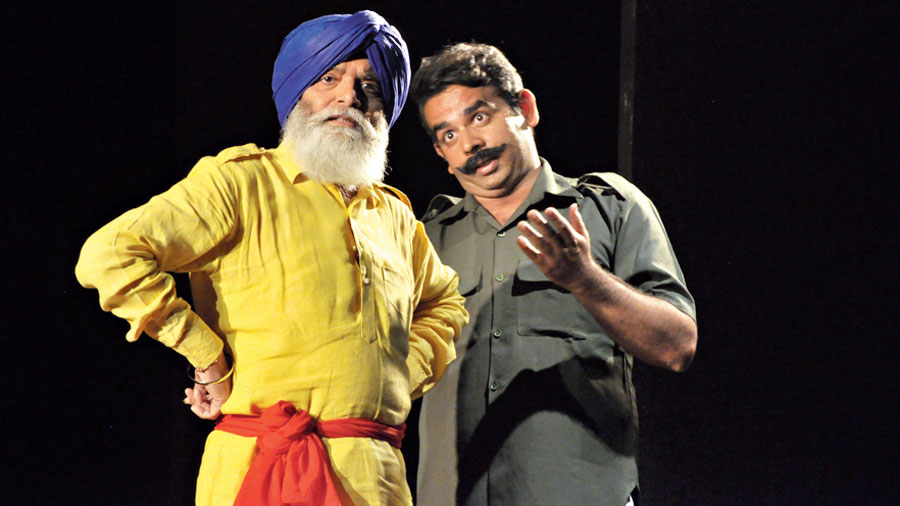The 10th edition of Little Thespian’s national theatre festival (March 22-27), aptly titled ‘Jashn-e-Rang’ (Celebration of Theatre), reiterated the group’s commitment to varied theatrical expressions in India. Organized in a truncated form and in adherence with the Covid-19 protocol at Gyan Manch, this year’s programme saw a happy union of the traditional and the contemporary.
Among the works hitherto not written about in this page, Indian Mime Theatre’s Maa Lakshmi Putul Nach Party was a show stealer from the word go. Conceived and directed by mime exponent Niranjan Goswami, this riveting production, banking mostly on mime, explored the internal dynamics of a traditional puppetry company dealing with strings and a faux pas leading to hilarious consequences. However, no real strings were pulled as a group of full-bodied actors played out Ekaler Laila Majnu with two others multitasking from above. Supported by a boisterous live music that toyed with different tenets of Bengali popular culture, old and new, this 30-minute drama provided wholesome entertainment to an appreciative audience on March 24. Goswami, who played an old-world adhikari complete with medals and badges, regaled with his witty wordplays. Cracker of an idea bolstered by outstanding coordination between the actors and the musicians helped achieve this stupendous success.
Sutradhar from Azamgarh presented an adaptation of Premchand’s Hindi story, “Boodhi Kaki”. Director Abhishek Pandit adopted a direct story-telling method with multiple narrators collaborating with a live band. Snatches from indigenous performative traditions like launda naach won the ensemble a few brownie points. The overall impact was, however, insipid.
Delhi-based Collegiate Drama Society, founded in 1978, left a strong impression in its Calcutta debut with Nastik Shaheed Bhagat Singh (picture). Scripted by late Charan Dass Sidhu, this happens to be the third play of Sidhu’s trilogy on Bhagat Singh. Based on the last six months of the revolutionary’s life at the Lahore jail, the production was built on Singh’s candid conversations with a jail official, a sanitation worker, Singh’s defence counsel and a Sikh rebel. Situations inspired by Singh’s famed essay “Why I am an Atheist” and writings from the jail formed the backbone of this verbose piece designed in conventional proscenium terms. The message was loud and direct. Director Ravi Taneja, who also essayed a significant part, provided the audience some relief by punctuating the 100-minute drama with live songs dated to Singh’s days, including Ram Prasad Bismil’s masterpiece “Mera rang de basanti chola” that brought the curtains down.
Roohein, the latest offering from Little Thespian, was staged for the second time on March 25. Written and directed by S.M. Azhar Alam, Roohein is set in a royal graveyard. Manned by an old gatekeeper who shares a supernatural association with the apparitions, it is essentially a metaphysical commentary on futility of State power and a critique of court intrigue. Led from the front by Alam and Uma Jhunjhunwala who flirted with old-school melodrama, the poetic piece depended heavily on a young cast who looked eager to prove a point. A pliable stage lit in grey and blue shades formed a fitting backdrop. The festival would go down in history as the last stage appearance of Alam, the artistic director of Little Thespian, who succumbed to Covid-19 related complications three weeks after the festival, bringing the curtains down on Urdu theatre in downtown Calcutta.










